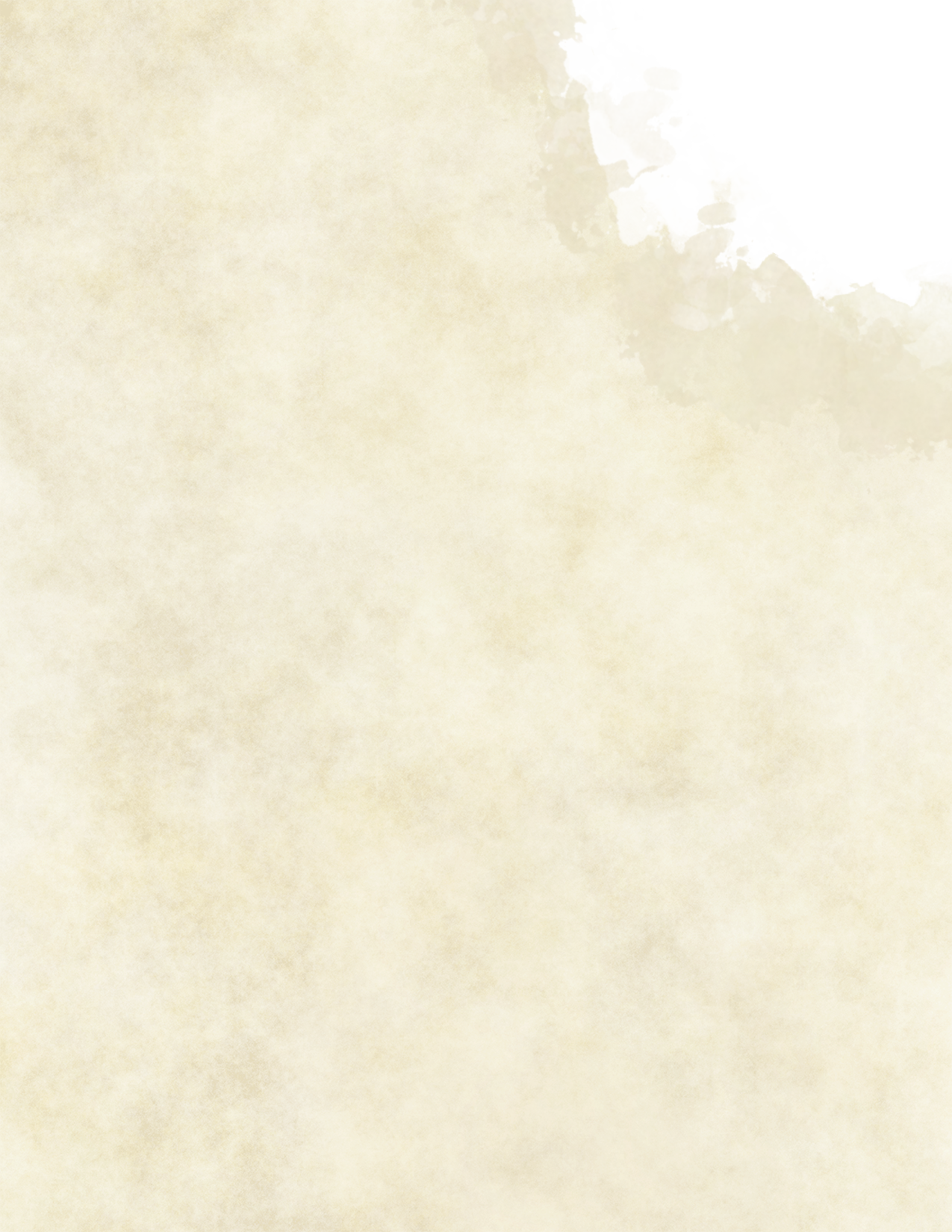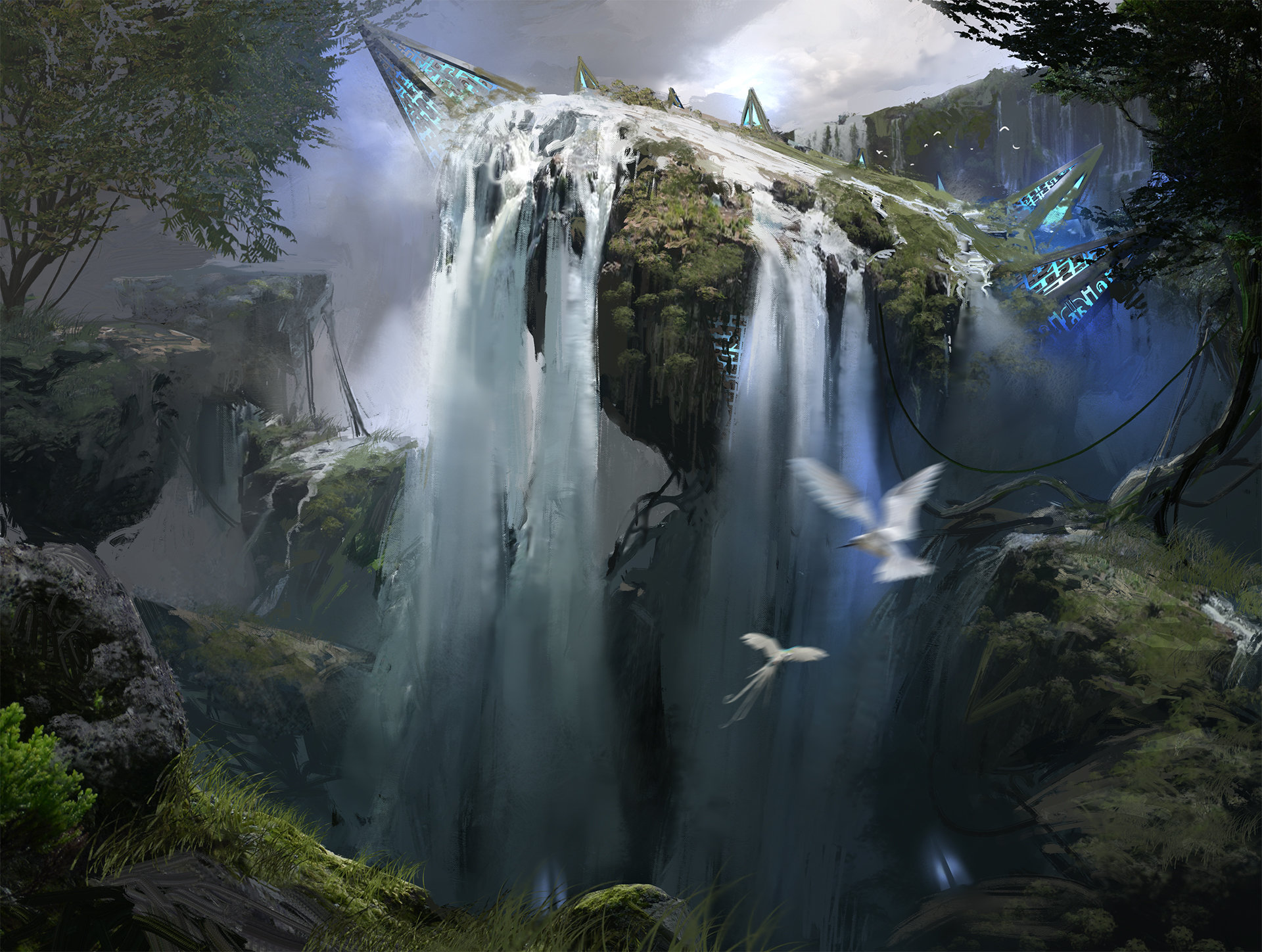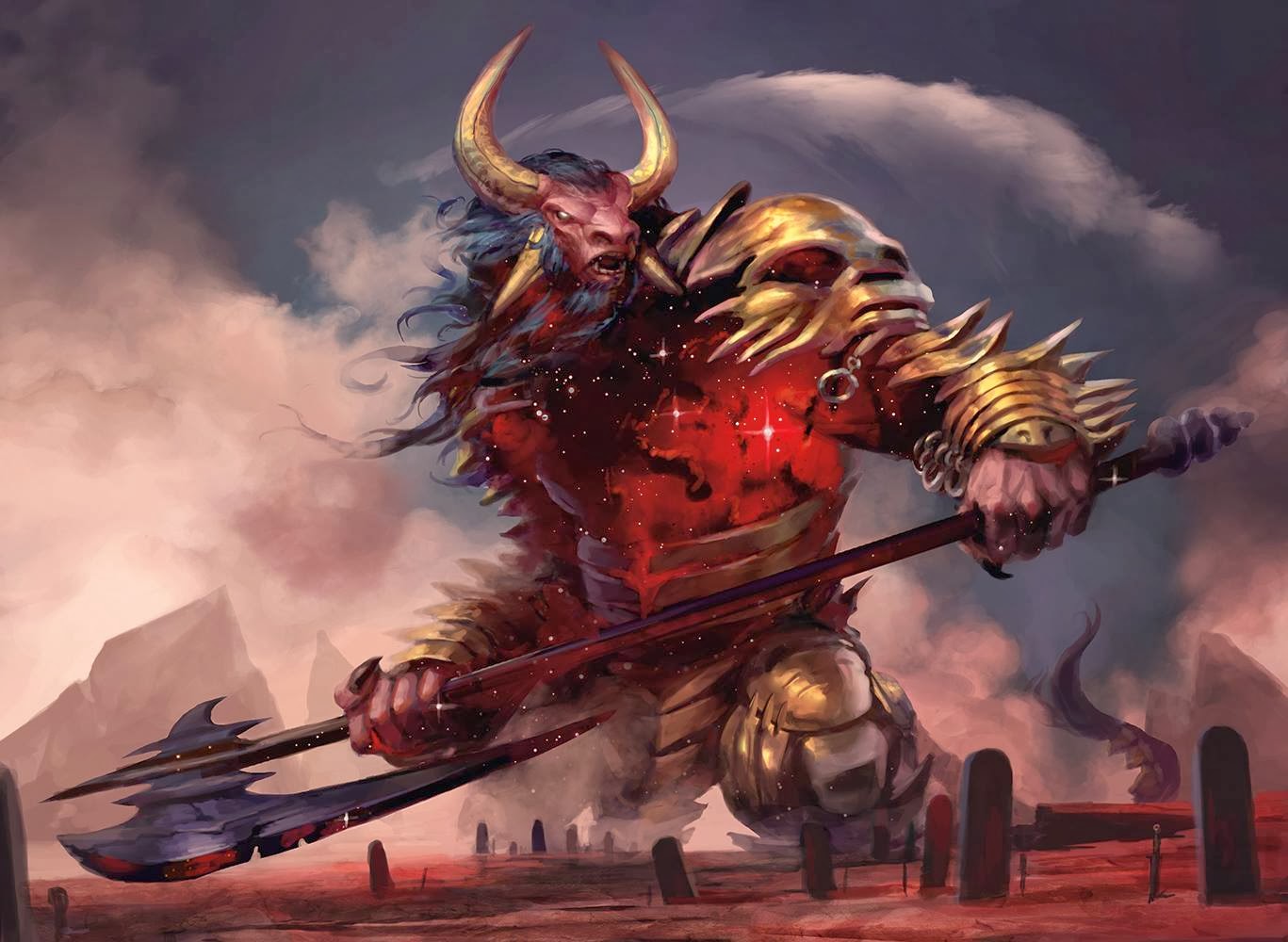


Transient
An elf twirls a short blade idly in his offhand. Clasped in his other, a jagged quartz crystal lets off a soft light as he begins to chant under his breath, casting light on the towering ogre before him. Suddenly, ogre leaps forward, its massive club aimed squarely at the elf's head. In a flash, the elf vanishes, and the club slams into the dry dirt, leaving a sizable crater. As the ogre's eyes dart about, searching for its prey, the elf reappears mid-leap, blade lunging for the ogre's back. With the squelch of a blade piercing flesh, the ogre tumbles to the ground.
A fearless human stands at the front of an army of knights, working with them to push back an orcish army that threatened to invade their kingdom. Soon, the invaders are fleeing as the earth itself seems to erupt under their feet, the human sending orcs flying out of the battle by manipulating the elements around them.
Transients are pursuers of extraplanar knowledge, and harness the power of the various planes using magic. They dance between planes to avoid their enemies and to shift the tide of battle in their favor. Their pursuits are as varied as the many planes they travel: some transients invoke the might of the Elemental Planes, while others may prefer to unleash uncontrollable fiends from the Fiendish Planes.
Conduits of Magic
In a similar manner to clerics, transients act as conduits. However, instead of pulling their divine magic from a deity, they learn to become conduits for the arcane magic that all planes exude, channeling it into spells.
This sort of relationship between a transient and a plane is called a "resonance", which mimics attuning to magic items. Before any given transient is able to pull power from a plane, they must research that plane, and eventually bond with it.
Most novice transients practice these resonances by bonding with transitive planes, such as the Ethereal or Astral Planes, souls being naturally attuned to them.
Planar Wanderers
In order to understand the influence of planes, most transients take to wandering the multiverse, attempting to find links between planes, such as planar portals, to study them. Planar portals offer incredible examples of how to channel planar power, but they cannot be moved, meaning those who wish to understand them must travel to observe all different forms of links between planes.
This constant travel sends transients on many adventures. Often, they get caught up in large quests in an attempt to find a planar portal, as a byproduct of the exotic nature of such planar links. Some are easier to get to than others, but getting to one portal might be extensive and exhaustive enough to end up being a massive, sprawling adventure, that sends a transient on a daring escapade to find it.
.
Creating a Transient
Creating a transient character hinges on a core drive to explore the planes. What does your character seek to find? How did you uncover the existence of the many planes?
What drives you to keep searching, despite the dangers? Have you heard promise of a plane where you feel you will truly belong?
Understanding your character's ties to the planes is crucial. Because not every setting has a similar planar system to the Forgotten Realms, it's important to talk to your DM about how the planes work in their setting, and to work with them to decide your ties.
Quick Build
You can make a transient quickly by following these suggestions. First, put your highest ability score in Intelligence, followed by Dexterity. If you resonate with the Wild planes, make Constitution your next-best score. Second, choose the scholar background.
Class Features
As an transient, you gain the following class features.
Hit Points
- Hit Dice: 1d8 per transient level
- Hit Points at 1st Level: 8 + your Constitution modifier
- Hit Points at Higher Levels: 1d8 (or 5) + your Constitution modifier per transient level after 1st
Proficiencies
- Armor: light armor
- Weapons: simple weapons, shortswords, whips, rapiers, scimitars
- Saving Throws: Dexterity, Intelligence
- Skills: Choose three from Arcana, History, Investigation, Nature, Perception, Persuasion, Religion, Survival


The Transient
| Level | Proficiency Bonus |
Features | Planesteps | 1st | 2nd | 3rd | 4th | 5th |
|---|---|---|---|---|---|---|---|---|
| 1st | +2 | Planestep, Conveyance, Portal Awareness | 2 | – | – | – | – | – |
| 2nd | +2 | Spellcasting, Fighting Style | 2 | 2 | – | – | – | – |
| 3rd | +2 | Planar Resonance | 3 | 3 | – | – | – | – |
| 4th | +2 | Ability Score Improvement | 3 | 3 | – | – | – | – |
| 5th | +3 | Extra Attack | 3 | 4 | 2 | – | – | – |
| 6th | +3 | Quickstep | 4 | 4 | 2 | – | – | – |
| 7th | +3 | Resonance Feature | 4 | 4 | 3 | – | – | – |
| 8th | +3 | Ability Score Improvement | 4 | 4 | 3 | – | – | – |
| 9th | +4 | – | 4 | 4 | 3 | 2 | – | – |
| 10th | +4 | Link | 4 | 4 | 3 | 2 | – | – |
| 11th | +4 | Planewalk | 4 | 4 | 3 | 3 | – | – |
| 12th | +4 | Ability Score Improvement | 4 | 4 | 3 | 3 | – | – |
| 13th | +5 | – | 5 | 4 | 3 | 3 | 1 | – |
| 14th | +5 | Spatial Rift | 5 | 4 | 3 | 3 | 1 | – |
| 15th | +5 | Resonance Feature | 5 | 4 | 3 | 3 | 2 | – |
| 16th | +5 | Ability Score Improvement | 5 | 4 | 3 | 3 | 2 | – |
| 17th | +6 | – | 6 | 4 | 3 | 3 | 3 | 1 |
| 18th | +6 | Intangible | 6 | 4 | 3 | 3 | 3 | 1 |
| 19th | +6 | Ability Score Improvement | 6 | 4 | 3 | 3 | 3 | 2 |
| 20th | +6 | Resonance Feature | 6 | 4 | 3 | 3 | 3 | 2 |
Equipment
You start with the following items, in addition to the equipment granted by your background:
- (a) two shortswords or (b) two simple weapons
- (a) a dungeoneer's pack or (b) an explorer's pack
- (a) a crystal or (b) a component pouch
- (a) 5 javelins (b) 20 darts or (c) a sling and 20 sling bullets
- leather armor
Alternatively, you may start with 4d4 x 10 gp to buy your own equipment.
Planestep
Starting at 1st level, you learn to attune parts of your body to the border Ethereal. As a bonus action, you partially merge with the border Ethereal Plane. While in this state, you cannot attack or cast spells, and you take half damage from effects in your original plane. You can end this effect at the end of your current turn or at the start of your next turn.
The number of times you can use this is shown on the transient table. When you finish a short or long rest, you regain all expended uses.
Conveyance
Additionally, at 1st level, you learn how to converse with extraplanar beings that may not know how to speak Common, by using universal hand gestures. You may use hand motions to speak with creatures that don't share a language with you if they have an Intelligence score equal to or higher than 10, taking 10 times as long as a normal conversation would.
Portal Awareness
At 1st level, you have learned how to sense the presence of planar portals. By spending 10 uninterrupted minutes in concentration (as if you were concentrating on a spell), you detect the distance and direction to the closest planar portal within 5 miles of you.
Additionally, if you are within 30 feet of a portal you have detected in this way within the last 24 hours, you can see a faint aura encompassing the entrance of the portal. The DM determines the color of the aura based on the plane the portal is linked to. For example, a portal to the Feywild might appear as a deep green aura, while a portal to Elysium might appear as a soft golden aura.
Spellcasting
By 2nd level, you have learned to draw on planar magic. See chapter 10 for the general rules of spellcasting.
Preparing and Casting Spells
The Transient table shows how many spell slots you have to cast your spells. To cast one of your transient spells of 1st level or higher, you must expend a slot of the spell's level or higher. You regain all expended spell slots when you finish a long rest.
You prepare the list of transient spells that are available for you to cast, choosing from the transient spell list. When you do so, choose a number of transient spells equal to your Intelligent modifier + half your transient level, rounded down (minimum of one spell). The spells must be of a level for which you have spell slots.
For example, if you are a 5th-level transient, you have four 1st-level and two 2nd-level spell slots. With a Intelligence of 14, your list of prepared spells can include four spells of 1st or 2nd-level, in any combination. If you prepare the 1st-level spell cure wounds, you can cast it using a 1st-level or a 2nd-level slot. Casting the spell doesn't remove it from your list of prepared spells.
You can change your list of prepared spells when you finish a long rest. Preparing a new list of transient spells requires time spent in research and preparation: at least 1 minute per spell level for each spell on your list.
Spellcasting Ability
Intelligence is your spellcasting ability for your transient spells, drawing power from the various planes. You use your Intelligence whenever a spell refers to your spellcasting ability. In addition, you use your Intelligence modifier when setting the saving throw DC for a transient spell you cast and when making an attack roll with one.
Spell Save DC
Spell attack modifier
Ritual Casting
You can cast a transient spell as a ritual if that spell has the ritual tag and if the spell is on the transient spell list. You don't need to have the spell prepared.
Spellcasting Focus
You can use a crystal, wand, or rod (found in chapter 5) as a spellcasting focus for your transient spells.
Fighting Style
You adopt a particular style of fighting as your specialty. Choose one of the following options. You can't take the same Fighting Style option more than once, even if you get to choose again.
Archery
You gain a +2 bonus to attack rolls you make with ranged weapons.
Dueling
When you are wielding a melee weapon in one hand and no other weapons, you gain a +2 bonus to damage rolls with that weapon.
Two-Weapon Fighting
When you engage in two-weapon fighting, you can add your ability modifier to the damage of the second attack.
Planar Resonance
At 3rd level, a specific group of planes resonates well with you, and you have focused your studies on them. This resonance grants you features at 3rd level and again at 7th, 15th, and 20th level.
Resonance Spells
Each plane has a list of associated spells. You gain access to these spells at the levels specified in the resonance's description. Once you gain access to a resonance spell, you always have it prepared. Resonance spells don't count against the number of spells you can prepare each day.
If you gain a resonance spell that doesn't appear on the transient spell list, the spell is nonetheless a transient spell for you.
Ability Score Improvement
When you reach 4th level, and again at 8th, 12th. 16th, and 19th level, you can increase one ability score of your choice by 2, or you can increase two ability scores of your choice by 1. As normal, you can't increase an ability score above 20 using this feature.
If your DM allows the use of feats, you may instead take a feat.
Extra Attack
Beginning at 5th level. you can attack twice, instead of once, whenever you take the Attack action on your turn.
Quickstep
At 6th level, you have learned to become ethereal to avoid incoming attacks. As a reaction to being hit by an attack, you can use your Planestep feature to reduce the incoming damage. When you reach 11th level, you can use your Planewalk feature instead to negate the incoming damage.
Link
At 10th level, you learn to create portals of your own. By performing a 10 minute ritual, you can create an 5 feet radius glyph centered on the spot you performed the ritual. You can expend a use of your Planestep to instead complete this ritual as an action. This glyph lasts for a number of hours equal to your transient level after creation, after which it is destroyed. You can have one glyph at a time. If you attempt create a second glyph, the first one will be destroyed upon the ritual's completion.
As an action, you can open up a portal centered at a point within 30 feet. The portal is a 10 foot tall cylinder with 5 foot radius, and the space within which is heavily obscured to all creatures other than you. When you create the portal, an identical portal is created, centered on the glpyh. Anything that enters a portal appearing in the unoccupied space nearest to the other portal. The portals last for 1 minute or until you sever the link as a bonus action, after which the portals close and the glyph is destroyed.
Planewalk
At 11th level, you have learned to fully attune to the border Ethereal, and can come and go between the planes as you please. When you Planestep, you can fully enter the Ethereal Plane. You are invisible on your original plane while you are in the Ethereal Plane and can't affect or be affected by anything on your original plane. While in this state you can occupy the space of another creature and move through solid objects. You can see into your original plane to a range of 120 feet, centered around the place you last were on that plane.
Additionally, when you reappear in a place already occupied by another creature, you can expend a spell slot to force them to reposition. The creature must make a Dexterity saving throw or be moved to the nearest unoccupied space and takes force damage. The damage is 4d6 for a 1st-level spell slot on a failed save, or half as much on a successful one. This feature deals an additional 2d6 for each spell level higher than 1st.



Spatial Rift
At 14th level you learn to bring two points in space together temporarily. As a bonus action, you can create a small portal in an unoccupied space that you can see within 30 feet of you. While this portal is open, you can make attacks or cast spells as if you occupied the portal's space. The portal closes at the end of your turn.
Intangible
At 18th level, you learn to use planar teleportation as an escape option. You can cast plane shift without expending a spell slot, targeting only yourself, once per long rest. Additionally, when you are reduced to 0 hit points but not killed outright, you can use your reaction to drop to 1 hit point instead and use this feature.
Transient Spells
1st Level
- Animal Friendship
- Comprehend Languages (R)
- Create or Destroy Water
- Detect Magic (R)
- Expeditious Retreat
- Feather Fall
- Find Familiar (R)
- Identify (R)
- Illusory Script (R)
- Longstrider
- Speak with Animals (R)
2nd Level
- Alter Self
- Blur
- Darkvision
- Invisibility
- Locate Animals or Plants (R)
- Locate Object
- Magic Mouth (R)
- Mirror Image
- Misty Step
- See Invisibility
3rd Level
- Blink
- Dispel Magic
- Glyph of Warding
- Leomund's Tiny Hut (R)
- Magic Circle
- Nondetection
- Sending
- Thunder Step*
- Tongues
4th Level
- Arcane Eye
- Banishment
- Dimension Door
- Freedom of Movement
- Greater Invisibility
- Hallucinatory Terrain
- Leomund's Secret Chest
- Locate Creature
- Mordenkainen's Private Sanctum
5th Level
- Banishing Smite
- Contact Other Plane (R)
- Creation
- Dream
- Far Step*
- Legend Lore
- Passwall
- Planar Binding
- Scrying
- Teleportation Circle
- Wall of Force


Planar Resonances
Within the Prime Material Plane, many regard the existence of other planes as religion or myth. To transients, however, the many planes offer answers to questions long sought after.
Transients, in their research of the planes, attune themselves to a handful of planes to draw on those dimensions' magic. This bond, known between transients as "resonance", defines the kinds of magic and abilities any transient has access to. Some find enjoyment in the celestial beauty of divine planes, where decadent angels roam stunning mounts, such as Mount Celestia or Elysium. Others take comfort in the judicial lawfulness of planes such as Mechanus or Arcadia. Those that dabble in the evil might take up Carceri or Pandemonium. Even stranger, some might pull eldritch energies from the space outside of the planes, the Far Realm. The planes you research determine the magical talents you apply in your adventures.
Subclass Design and Structure
Subclasses are created with a defined structure in mind. They are made as follows:
- At 3rd level, they gain their defining feature, which were designed to guide each subclass into playing their roles more effectively.
- At 7th level, they gain a feature to help them control the battlefield, either as an area of effect ability or as a form of other support or control.
- At 15th level, they gain additional effects on their Planewalk and Spatial Rift features.
- At 20th level, they gain the ability to cast a powerful spell once per long rest.


Subclasses
| Planar Resonance | Role | Page |
|---|---|---|
| Elemental Planes | Jack of All Trades, Skirmisher | 8 |
| Celestial Planes | Healer, Support | 9 |
| Fiendish Planes | Summoner, Support | 10 |
| Dark Planes | Disabler, Skirmisher | 11 |
| Wild Planes | Summoner, Tank | 11 |
| Planes of Order | Disabler, Support | 12 |
| Planes of Disorder | Skirmisher, Support | 12 |
The Elemental Planes
You study the elemental planes, and utilize their environments to your advantage.
Resonance Spells
You gain resonance spells at the transient levels listed.
| Transient Level | Resonance Spells |
|---|---|
| 3rd | Absorb Elements*, Chromatic Orb |
| 5th | Dragon's Breath, Enhance Ability |
| 9th | Elemental Weapon, Protection from Energy |
| 13th | Elemental Bane*, Control Minor Elementals |
| 17th | Conjure Elemental, Skill Empowerment |
Wand of the Elements
When you choose the Elemental Planes as your planar resonance at 3rd level, you learn to unleash strands of the Elemental Planes with destructive force.
As a bonus action, you can coalesce the traces of Elemental Planes into a shard of destructive power. When you create the shard, you can choose to make it deal fire, cold, thunder, or force damage. The shard counts as a simple melee weapon with which you are proficient, and can be used as a spellcasting focus. It deals 1d8 damage on a hit and has the finesse, light, and thrown (range 20/60) properties. The shard dissipates at the end of your turn if it is not in your hand.
Brave the Elements
At 7th level, you gain the ability to join one of the Elemental Planes with yours. As an action, you can turn an area of 30-foot radius into difficult terrain for 1 minute. You ignore this difficult terrain. Additionally, you can choose one of the additional effect:
Fire. When a hostile creature enters the area for the first time on a turn or starts its turn there, it is engulfed in flames and must make a Dexterity saving throw against your transient spell save DC. It takes 2d10 fire damage on a failed save, or half as much damage on a successful one.
Water. You can select a number of creatures in the area up to your Intelligence modifier to ignore the difficult terrain and become able to move through solid objects (such as the ground) as if they were water. Additionally, the area becomes heavily obscured with fog.
Earth. You create a number of stone pillars up to your Intelligence modifier, each 5 ft in diameter and 10 ft tall, in unoccupied spaces within the difficult terrain. Each pillar has an armor class of 17 and 30 hit points, and is immune to poison and psychic damage.
Air. You can select a number of creatures in the area up to your Intelligence modifier to ignore the difficult terrain and instead gain a 10 ft bonus to movement speed. Additionally, ranged weapon attacks that pass through the difficult terrain are at disadvantage.
Once you've used this ability, you must complete a short or long rest before you can use it again.
Infuse with the Elements
At 15th level, you learn to use the Elemental Planes for your abilities instead of the Ethereal. When you use your Spatial Rift feature, attacks that pass through the portal deal an additional 1d6 fire, cold, thunder, or force damage.
Additionally, when you reappear after using your Planewalk feature, you can inflict one of the following effects:
Fire. All creatures within 10 feet of you must make a Dexterity saving throw against your transient spell save DC. A creature takes 1d10 fire damage on a failed save, or half as much damage on a successful one.
Water. All Large or smaller creatures within 10 feet of you must make a Strength saving throw against your transient spell save DC or become grappled as ice binds them to the ground.
Earth. A statue of you made from mud appears where you disappeared, occupying the space where you used your Planewalk feature. If the statue takes any damage, or as a bonus action on your subsequent turns, you can make the statue explode into stone shards. Each creature within 10 feet of the statue must make a Dexterity saving throw against your transient spell save DC. A creature takes 2d6 bludgeoning damage on a failed save, or half as much damage on a successful one.
Air. All Large or smaller creatures within 10 feet of you must make a Strength saving throw against your transient spell save DC or be pushed back 10 feet.
Elemental Mastery
At 20th level, you gain the ability to manifest the purest form of your element. As a bonus action, you can cast the spell investiture of flame*, investiture of ice*, investiture of stone*, or investiture of wind* at lowest level without expending a spell slot. If cast this way, the spell does not require concentration, and you can swap between the four spells as a bonus action.
Once you've used any of this ability, you must complete a long rest before you can use any of them again.




The Celestial Planes
You study the holy planes, guided by their brilliance. You learn to channel the healing light of these planes.
Resonance Spells
You gain resonance spells at the transient levels listed.
| Transient Level | Resonance Spells |
|---|---|
| 3rd | Bless, Healing Word |
| 5th | Gentle Repose, Lesser Restoration |
| 9th | Mass Healing Word, Spirit Guardians |
| 13th | Aura of Life, Divination |
| 17th | Greater Restoration, Holy Weapon* |
Blessed Light
When you choose the Celestial Planes as your planar resonance at 3rd level, you gain the ability to use holy symbols as your spellcasting focus. Additionally, you gain proficiency in medium armors and shields.
Additionally, when you cast a spell that restores hit points to a creature, that creature gains a bonus to their next weapon attack it makes before the start of your next turn. This bonus is equal to your Intelligence modifier.
Brilliant Halo
At 7th level, you gain the ability to bless your allies with the light of the Celestial Planes. You have a pool of healing power that replenishes when you take a long rest. With that pool, you can restore a total number of hit points equal to your transient level × 5.
As a bonus action, you can bestow a shimmering halo to a creature within 30 feet of you. At the start of their turn, they draw power from your pool and regain a number of hit points up to your Intelligence modifier. While wearing the halo, the creature gains a bonus to Charisma (Persuasion) checks equal to your Intelligence modifier.
You can dismiss the halo or move it from one creature to another as a bonus action.
Selfless Spirit
At 15th level, you learn to use the Celestial Planes for your abilities instead of the Ethereal. When you hit a creature with a melee or ranged weapon attack through your Spatial Rift feature, the target sheds dim light in a 5-foot radius. The next attack roll made against this target before the end of your next turn has advantage.
Additionally, when you reappear after using your Planewalk feature, you can reappear in a place already occupied by an ally. When you do so, your ally is moved to the nearest unoccupied space and regains 4d6 hit points. If you reappear in an unoccupied space, you instead regain 2d6 hit points.
Angelic Favor
At 20th level, you embrace the divinity of the Celestial Planes. As an action, you can cast holy aura at lowest level without expending a spell slot. If cast this way, the spell does not require concentration.
Once you use this feature, you can't use it again until you finish a long rest.


The Fiendish Planes
You study the nine Hells and the Abyss, calling upon fiendish creature to aid you.
Resonance Spells
You gain resonance spells at the transient levels listed.
| Transient Level | Resonance Spells |
|---|---|
| 3rd | Bane, Hellish Rebuke |
| 5th | Crown of Madness, Scorching Ray |
| 9th | Fear, Summon Lesser Demon* |
| 13th | Charm Monster, Summon Greater Demon* |
| 17th | Geas, Infernal Calling* |
Diabolic Servitude
When you choose the Fiendish Planes as your planar resonance at 3rd level, you gain fiendish allies. When you cast find familiar, you can choose for your familiar to take on the form of an imp or a quasit. Your familiar's gains a bonus to its hit points equal to your transient level.
Additionally, when you take the Attack action, you can forgo one of your own attacks to allow your familiar to use its reaction to mke one attack of its own. If your familiar hits a creature, that creature has disadvantage on saving throws against any spell you cast before the end of your next turn.


Desecrated Earth
At 7th level, you gain the ability to join one of the Fiendish Planes with yours. As an action, you can fill an area of 30-foot radius with unholy energy for 1 minute.
Fiends within this area deal an additional 1d4 fire damage on attacks and gain a 1d4 bonus to attack rolls.
Once you've used this ability, you must complete a short or long rest before you can use it again.
Into the Maw of Hell
At 15th level, you learn to use the Fiendish Planes for your abilities instead of the Ethereal. When you use your Spatial Rift feature and your familiar is within range, you can choose instead to switch locations with your familiar.
Additionally, when you reappear after using your Planewalk feature, you can force all creatures within 10 feet of you to make a Charisma saving throw against your transient spell save DC or be transported to the Lower Planes. On a failed save, the creature dissapears and hurtles through a nightmare landscape. At the end of your next turn, the target returns to the space it previously occupied, or the nearest unoccupied space. If the target is not a fiend, it takes 2d6 psychic damage as it reels from its horrific experience.
Irresistable Summons
At 20th level, you master the art of forcefully bringing beings of extraordinary power into your plane. As an action, you can cast gate at lowest level without expending a spell slot. You can use it to target a specific creature, drawing it to your side of the portal.
Once you've used this ability, you must complete a long rest before you can use it again.
The Dark Planes
You study the Shadowfell and other dark realms, and impose its whispers upon your foes.
Resonance Spells
You gain resonance spells at the transient levels listed.
| Transient Level | Resonance Spells |
|---|---|
| 3rd | Arms of Hadar, Hex |
| 5th | Darkness, Shadow Blade |
| 9th | Hunger of Hadar, Nondetection |
| 13th | Shadow of Moil*, Evard's Black Tentacles |
| 17th | Enervation*, Mislead |
Clinging Darkness
When you choose the Dark Planes as your planar resonance at 3rd level, you gain the ability to see normally in dim light or darkness, both magical and nonmagical, to a distance of 120 feet.
Additionally, you become invisible while you are using your Planestep feature in dim light or darkness. If you are invisible when your Planestep ends, you have advantage on the first attack you make before the end of your turn.
Dance of Shadows
At 7th level, you gain the ability to join one of the Dark Planes with yours. As an action, you can suppress all magical lights created by spells of 3rd level or lower within an area of 30-foot radius for 1 minute.
All creatures within this area appear as dark featureless shapes with muffled and indistinguishable voices. Whenever a hostile creature chooses a target, it must make an Intelligence (Investigation) check against your transient spell save DC or choose at random from among the creatures it can see within range.
Once you've used this ability, you must complete a short or long rest before you can use it again.
Touch of Darkness
At 15th level, you learn to use the Dark Planes for your abilities instead of the Ethereal. When you use your Spatial Rift feature, the portal takes on your appearance, and can be moved using your movement speed. Attacks that pass through the portal deal an additional 1d6 necrotic damage.
Additionally, when you reappear after using your Planewalk feature, you can force all creatures within 10 feet of you to make a Wisdom saving throw against your transient spell save DC or become frightened of you until the end of your next turn.
Dark Suspicions
At 20th level, you bring madness from the Dark Planes. As an action, you can cast maddening darkness* at lowest level without expending a spell slot. If cast this way, the spell does not require concentration.
Once you've used this ability, you must complete a long rest before you can use it again.
The Wild Planes
You study the Feywild and other verdant planes, bringing its flora and fauna to your aid.
Resonance Spells
You gain resonance spells at the transient levels listed.
| Transient Level | Resonance Spells |
|---|---|
| 3rd | Sleep, Faerie Fire |
| 5th | Beast Sense, Locate Animals or Plants |
| 9th | Conjure Animals, Plant Growth |
| 13th | Conjure Woodland Beings, Grasping Vine |
| 17th | Tree Stride, Wrath of Nature* |
Guardian Beast
When you choose the Wild Planes as your planar resonance at 3rd level, you learn to summon more powerful animal companions. When you cast find familiar, your familiar can take the form of any beast of or under CR 1/4. This CR increases to 1/2 at 7th level, 1 at 11th level, 2 at 15th level, and 3 at 19th level.
Your familiar can attack, but loses Multiattack action, if it has one.
Spirit Link
At 7th level, you have walked the planes with your beast. When you use your Planestep feature, your familiar also benefits from it. Additionally, you can make any spell you cast that targets only you also target your familiar if they are within 30 feet of you.
Choking Vines
At 15th level, you learn to use the Wild Planes for your abilities instead of the Ethereal. When you use your Spatial Rift feature, attacks that pass through the portal burst into vines upon impact. A creature hit by your attack must make a Strength saving throw against your transient spell save DC or become grappled until the end of your next turn. They can repeat this saving throw as an action at the start of their turn.
Additionally, when you reappear after using your Planewalk feature, you can force creatures creatures within 10 feet of to make a Strength saving throw against your transient spell save DC or become entangled in dense vines. On a failed save, the creature is restrained for one minute. A creature can repeat the Strength saving throw as an action. On a successful save, the creature is not restrained.
Beast Within
At 20th level, you become the beasts of the Wild Planes. As an action, you can cast animal shapes targeting only yourself at lowest level without expending a spell slot. If cast this way, the spell does not require concentration.
Once you've used this ability, you must complete a long rest before you can use it again.
The Planes of Order
You study Mechanus and the other ordered planes.
Resonance Spells
You gain resonance spells at the transient levels listed.
| Transient Level | Resonance Spells |
|---|---|
| 3rd | Heroism, Compelled Duel |
| 5th | Hold Person, Zone of Truth |
| 9th | Counterspell, Glyph of Warding |
| 13th | Death Ward, Mordenkainen's Faithful Hound |
| 17th | Hallow, Hold Monster |
Equal Treatment
When you choose the Planes of Order as your planar resonance at 3rd level, your lawful magic holds all beings to the same standards. When you cast a spell that requires more than one creature to make a saving throw, one target is chosen at random to make the saving throw. If they fail or succeed, all creatures affected also fail or succeed.
Absolute Law
At 7th level, you gain the ability to shift things toward their natural order. You can replace any attack roll, damage roll, saving throw, or ability check made by you or a creature that you can see with the average value of the dice (rounded down). You can choose to do this after you roll the die, but before the outcome is determined.
Once you've used this ability, you must complete a short or long rest before you can use it again.
Rule of Law
At 15th level, you learn to use the Planes of Order for your abilities instead of the Ethereal. When you use your Spatial Rift feature, attacks that pass through the portal cut reliably. Choose one dice from the damage roll and maximize it.
Additionally, when you reappear after using your Planewalk feature, you can force creatures creatures within 10 feet of to make a Wisdom saving throw against your transient spell save DC or become cut off from its source of magic. The creature is unable to cast any spells until the end of your next turn.
Dueling Grounds
At 20th level, you channel the Planes of Order to create a fair field of battle. As an action, you can cast antimagic field at lowest level without expending a spell slot. If cast this way, the spell does not require concentration.
Once you've used this ability, you must complete a long rest before you can use it again.
The Planes of Disorder
You study Limbo and the other chaotic planes, good and bad.
Resonance Spells
You gain resonance spells at the transient levels listed.
| Transient Level | Resonance Spells |
|---|---|
| 3rd | Chaos Bolt*, Disguise Self |
| 5th | Nystul's Magic Aura, Suggestion |
| 9th | Bestow Curse, Enemies Abound* |
| 13th | Confusion, Polymorph |
| 17th | Mislead, Seeming |
Chaos Warp
When you choose the Planes of Disorder as your planar resonance at 3rd level, your planar magic can unleash surges of untamed magic. When you end your Planestep feature, the DM can have you roll a d20. If you roll a 1, roll on the Wild Magic Surge table to create a random magical effect. A Wild Magic Surge can happen once per turn.
Grip of Chaos
At 7th level, you learn to protect yourself using energies from the Planes of Disorder. When you are targeted by a spell that targets only you, you can redirect it to another target at random from among the creatures you can see within range.
Once you've used this ability, you must complete a short or long rest before you can use it again.
Defender of Chaos
At 15th level, you learn to use the Planes of Disorder for your abilities instead of the Ethereal. When you use your Spatial Rift feature and have advantage on an attack roll that passes through the portal, you can roll on the Wild Magic Surge table if you roll a 1 on either of the d20.
Additionally, when you reappear after using your Planewalk feature, you can roll directly on the Wild Magic Surge table.
Chaoslace
At 20th level, you manifest the Planes of Disorder as you please. As an action, you can cast prismatic spray at lowest level without expending a spell slot. If cast this way, the spell does not require concentration.
Once you've used this ability, you must complete a long rest before you can use it again.

Explore
The
Planes
The Transient began with the idea of a class that shifts between planes. Since then the idea has grown into this daring explorer that braves many planes.
Many thanks to the folks from the /5eg/ discord for helping iron out the class's inconsistencies and flaws, to my players who provide reliable feedback and are never afraid to voice their concerns, and to the amazing artists of Magic the Gathering for providing eye catching panel art and endless inspiration.
/u/aeyana and /u/BioOnPC
Art Credits
Tetsuko Umezawa, Fugitive by Randy Vargas
Prototype Portal by artpox
Part the Waterveil by Titus Lunter
Battle for Zendikar by Aleksi Briclot
Planeswalkers Pantheon by Cryptcrawler
Conqueror's Galleon by Emrah Elmasli
Chandra's Fury by Volkan Baga
Kingdom of Heaven by sswanderer
Mogis, God of Slaughter by Peter Mohrbacher
Canopy Vista by Titus Lunter